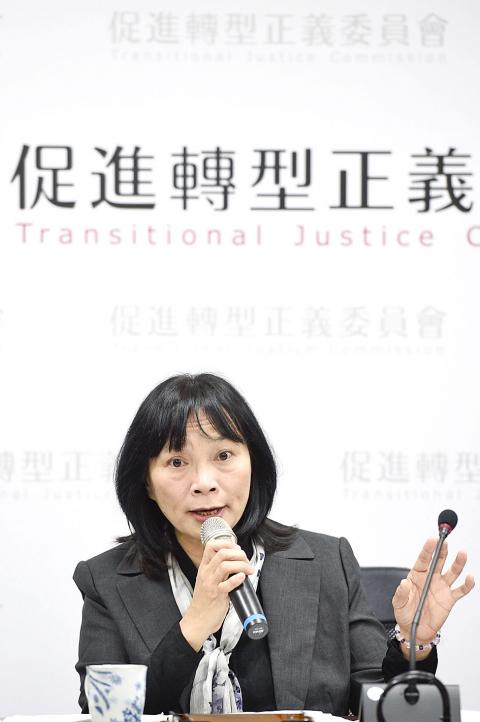Transitional Justice Commission Acting Chairwoman Yang Tsui (楊翠) yesterday said that the commission is shifting its attention to declassifying documents and dealing with authoritarian symbols.
Yang made the remarks during a radio interview, when the host asked her to comment on the commission’s next order of business following the one-year anniversary of its founding on May 31 last year.
The commission is to step up its efforts to collect records and documents from archives and depositories over the next year, with an eye toward increasing the volume of documents available, while it plans to start dealing with authoritarian symbols this month, she said.

Photo: George Tsorng, Taipei Times
When asked to identify the commission’s main challenges, Yang said that the bureaucratic instinct toward secrecy remains a difficulty during historical reconstruction and declassification efforts.
To exonerate victims of political persecution, the commission must first investigate the historical facts surrounding their cases, but the materials it has obtained from government agencies have often been redacted to the point of illegibility, she said.
The commission frequently has to negotiate with governmental agencies for access to documents in a less-censored form, she said.
An important contributing factor to these difficulties is the belatedness of the nation’s transitional justice program, she said, adding that resistance to transparency in many cases is rooted in institutional habit, not ill-intent.
“I believe transitional justice is a work of advocacy of which communication is a part,” she said, adding that the commission is overseeing its sixth large-scale transfer of documents of about 130,000 items.
Asked to name an event of personal emotional resonance she experienced as a member of the commission over its first year, Yang said that she was moved when former Japanese Imperial Navy veteran Huang Chin-tao (黃金島) showed up in a wheelchair at the commission’s first-ever ceremony on Oct. 5 last year, held to exonerate victims of political persecution, despite him suffering an illness.
“I was very much moved when I saw the corner of Huang’s eye glisten and he shook with emotion as he went through the documents of exoneration during the ceremony,” she said.
As she is a descendent of novelist Yang Kui (楊逵), who was jailed for 12 years for political crimes, it was deeply gratifying to see Huang at the ceremony, Yang said.
Born in Taichung during the Japanese colonial era, Huang served as a volunteer soldier in the Imperial Japanese Navy.
After Japan’s defeat in World War II in 1945, he was detained in China’s Hainan Province before escaping and returning to Taiwan.
He headed an armed uprising against Chinese Nationalist Party (KMT) troops following the 228 Incident in 1947, an act for which he received a death sentence that was later commuted to life in prison.
He was released in 1975 after serving 24 years in prison.
Huang died in January aged 93.

Chinese Nationalist Party (KMT) Chairman Eric Chu (朱立倫), spokeswoman Yang Chih-yu (楊智伃) and Legislator Hsieh Lung-chieh (謝龍介) would be summoned by police for questioning for leading an illegal assembly on Thursday evening last week, Minister of the Interior Liu Shyh-fang (劉世芳) said today. The three KMT officials led an assembly outside the Taipei City Prosecutors’ Office, a restricted area where public assembly is not allowed, protesting the questioning of several KMT staff and searches of KMT headquarters and offices in a recall petition forgery case. Chu, Yang and Hsieh are all suspected of contravening the Assembly and Parade Act (集會遊行法) by holding

PRAISE: Japanese visitor Takashi Kubota said the Taiwanese temple architecture images showcased in the AI Art Gallery were the most impressive displays he saw Taiwan does not have an official pavilion at the World Expo in Osaka, Japan, because of its diplomatic predicament, but the government-backed Tech World pavilion is drawing interest with its unique recreations of works by Taiwanese artists. The pavilion features an artificial intelligence (AI)-based art gallery showcasing works of famous Taiwanese artists from the Japanese colonial period using innovative technologies. Among its main simulated displays are Eastern gouache paintings by Chen Chin (陳進), Lin Yu-shan (林玉山) and Kuo Hsueh-hu (郭雪湖), who were the three young Taiwanese painters selected for the East Asian Painting exhibition in 1927. Gouache is a water-based

Taiwan would welcome the return of Honduras as a diplomatic ally if its next president decides to make such a move, Minister of Foreign Affairs Lin Chia-lung (林佳龍) said yesterday. “Of course, we would welcome Honduras if they want to restore diplomatic ties with Taiwan after their elections,” Lin said at a meeting of the legislature’s Foreign Affairs and National Defense Committee, when asked to comment on statements made by two of the three Honduran presidential candidates during the presidential campaign in the Central American country. Taiwan is paying close attention to the region as a whole in the wake of a

OFF-TARGET: More than 30,000 participants were expected to take part in the Games next month, but only 6,550 foreign and 19,400 Taiwanese athletes have registered Taipei city councilors yesterday blasted the organizers of next month’s World Masters Games over sudden timetable and venue changes, which they said have caused thousands of participants to back out of the international sporting event, among other organizational issues. They also cited visa delays and political interference by China as reasons many foreign athletes are requesting refunds for the event, to be held from May 17 to 30. Jointly organized by the Taipei and New Taipei City governments, the games have been rocked by numerous controversies since preparations began in 2020. Taipei City Councilor Lin Yen-feng (林延鳳) said yesterday that new measures by